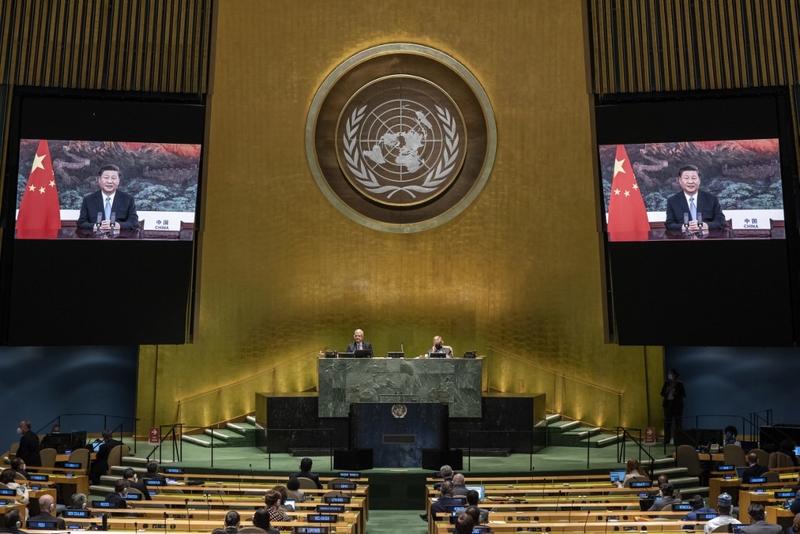 This UN handout photo shows President of the People's Republic of China, Xi Jinping(on screen), as he addresses the general debate of the seventy-fifth session of the United Nations General Assembly, on Sept 22, 2020 at the UN in New York. (PHOTO / AFP)
This UN handout photo shows President of the People's Republic of China, Xi Jinping(on screen), as he addresses the general debate of the seventy-fifth session of the United Nations General Assembly, on Sept 22, 2020 at the UN in New York. (PHOTO / AFP)
President Xi Jinping’s strong support for the United Nations' central role in global affairs has reaffirmed China’s commitment to multilateralism and to the maintenance of a rules-based global order, analysts said.
"No country has the right to dominate global affairs, control the destiny of others or keep advantages in development all to itself," Xi said in a video speech delivered at a high-level meeting in honor of the UN's 75th anniversary.
Mutual respect and equality among all countries, big or small, is the foremost principle of the UN Charter, Xi said in his Sept 21 speech. He stressed that “unilateralism is a dead end” and opposed any country acting like boss of the world.
Nawazish Mirza, associate professor of finance at the Excelia Business School in France, said Xi’s speech is a reiteration of China’s “long pursued policy of peace and global collaboration”.
“His focus on using the UN as a meaningful platform and not to allow the dominance of any form is a clear indication that China values global independence, sovereignty, and cooperation,” Mirza told China Daily.
Analysts support Xi’s view on multilateralism, noting this will promote global cooperation and give more voice to developing countries
Rene Pattiradjawane, chairman of the Indonesia-based Center for Chinese Studies, touched on Xi's emphasis on ‘hegemon’, ‘bullying’ and ‘boss of the world’, noting that this has shown that “the global political relations have become a theatre of thugs that threatens the very foundations of the establishment of the UN 75 years ago”.
“The game of power of the big countries in every corner of the world tends to daze the old practices of extraterritoriality, expanding the limit that sparked the growth of colonialism and imperialism in the 19th century,” he said.
READ MORE: Xi: China supports UN system
Pattiradjawane said that the global order has changed since UN’s establishment, noting that “domination and cooptation of new international relations is not an option”.
“Every big power should cooperate in the manner way under the auspices of rule-based order as a prerequisite toward stability and prosperity. The rise of China as a superpower is a direct consequence of globalization that has been a push to the edge in opening the world market without delimitation,” he said.
He said China and most countries in the world obliged when then United States President Ronald Reagan, United Kingdom’s Prime Minister Margaret Thatcher and Japanese Prime Minister Yasuhiro Nakasone laid the foundation of liberal economies in the 1990s, with a pretext to open global market economy and promote liberal democracy.
Wang Yanbo, assistant professor, Department of Strategy and Policy at the National University of Singapore’s (NUS) Business School, said most of the global organizations such as the UN were created about 70 years ago and reflected the global power structure and geopolitical thinking of the mid-20th century. But he said it remains unclear if these organizations are "well suited to address the global reality of the 21st century".
ALSO READ: Experts hail president's speech at general debate
"The key challenge for a rising power like China is to achieve a balance between playing a leading role in reforming existent international organizations such as the UN, World Bank and IMF to ensure their capability to fit the new realities of the 21st century and not being perceived as a revisionist power that would undermine the key interests of other great powers," he said.
Xi also said in his UN speech that international laws should not be distorted or used as a pretext to undermine other countries' legitimate rights and interests. He also called on UN members to put into practice the principle of multilateralism.
Analysts support Xi’s view on multilateralism, noting this will promote global cooperation and give more voice to developing countries.
Pattiradjawane said that Xi proposed multilateralism to promote amity, cooperation and opening up.
“A multilateral coexistence is a bridge to ensure that the risk shock mode the world is facing won’t drag the medium and smaller countries into an open-ended misery,” he said.
Wang of NUS said that Xi’s public commitment to multilateralism will help other countries “to understand and buy in China’s strategic vision”.
“Multilateralism requires collaboration by other parties. While the voices and interests of minor powers are important to incorporate, most likely the feasibility and success of a global regime featured with multilateralism is determined by how great powers like China, the United States, European Union and Japan communicate, coordinate and accommodate,” he said.
Mirza of Excelia Business School believes that Xi’s call to expand the representation of developing countries is a “sensible” move.
“More than 95 percent of the global population resides in these countries and is the source of some critical international conflicts,” he said.
Mirza said that by stressing on the concerns of developing countries, China is not only supporting global equity but also fostering global cooperation.
Mirza said Xi’s speech also indicates China’s commitment to contribute towards the global governance system.
China’s policy “is very clear about creating a conducive international environment through actionable policy interventions,” he said.


